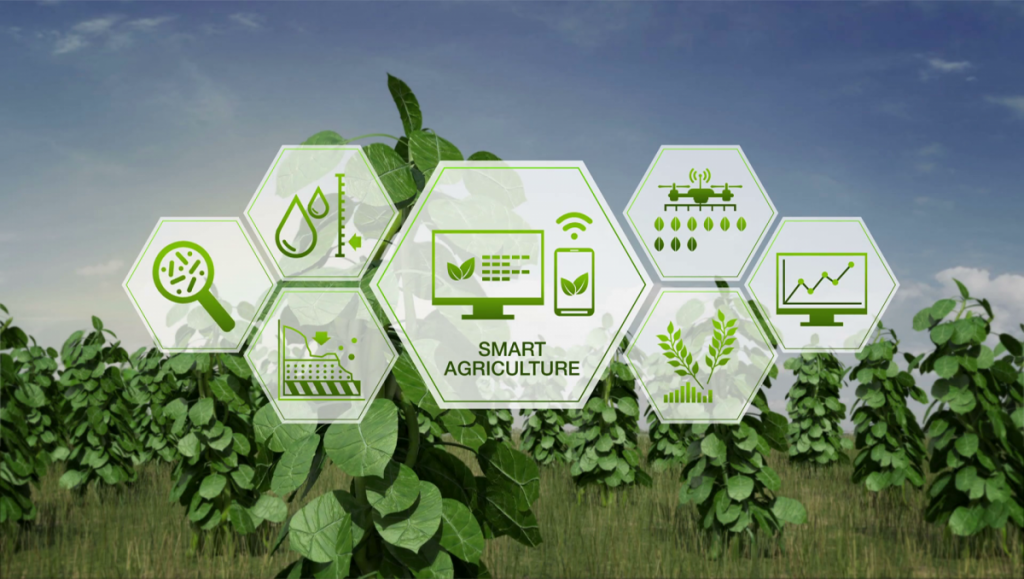Table of Contents
Mankind has been practicing agriculture for thousands of years. It started developing in the early ages, but we could also state that the rapid growth began during the last 200 years.
Nowadays, agriculture faces a lot of challenges as the production needs are growing, while the resources stay at the same level. We’ll need to produce 70% more food products than we do now by 2050. We can’t get more soil, but we can use resources mindfully and minimize losses.
Agriculture companies all over the world aim to optimize their work, achieve better planning and yield prediction and switch to automation as much as possible.
Smart technologies become a solution for these challenges. Instead of old-fashioned ways of agriculture management, livestock breeding, and crop growing, top companies implement business tools, the Internet of Things (IoT), and Artificial Intelligence (AI) in order to increase production capabilities and automate business processes.
In this article, you can learn about software that turns agriculture into one of the most digitized domains. We gathered solutions that increase the productivity of agriculture companies, as well as make mundane tasks like harvesting and cattle care easier.
What software you need to optimize your business processes
Apart from the innovative usage of new technologies such as IoT, AI, or agriculture drone software, agriculture enterprises need strong, efficient software for managing purposes. Some of these objectives are:
- crop, field, and soil monitoring;
- cattle monitoring;
- facility maintenance;
- yield and harvest estimation and prognosis;
- finance managing and reporting;
- resources optimization;
- staff management;
- risk handling.
These tasks require the engagement of a massive number of specialists and bring a few challenges: how to optimize these processes? How to increase their accuracy and train employees efficiently? Moreover, agriculture depends largely on weather conditions (that people don’t have any control of) so the risk of bag yield is always there and requires a certain amount of preparation and assessments.
Due to its scale and importance, agriculture is one of the first industries to embrace digital transformation and move to a new technical approach to cultivating and cattle breeding. But On the other hand, the digital solution also optimizes management and turns agro-companies to data-driven decision-making. Therefore, there is a place for agriculture app development that automizes your business processes.
So what software your agriculture company may need? Our top suggestion is an ERP system. It’s a must-have for any big business with a significant number of employees and facilities.
The main ERP benefits include decreased operation costs, quicker and more efficient cooperation between different departments, and more accurate decision-making based on the actual data.
ERP unites all business processes in one place and logs all the information from any department. Basically, instead of tones of spreadsheets, emails, and documents, you get a convenient, fast database that can:
- plan and track your production planting and harvest;
- manage supply chains, calculate and plan purchases of seeds, fertilizers, water, equipment;
- create automatic financial reports on company balance, income, and expenses;
- monitor compliance to required protocols and detect bottlenecks;
- manage your employees, including seasonal workers, and create satisfying conditions for them;
- monitor your livestock condition automatically — life cycle, veterinarian check-ups, weight, etc.;
- conduct field mapping and calculate amounts of fertilizer needed and workforce to collect the crop;
- collect and display essential data on dashboards.
It’s just some features ERP can give you. There are a lot of ready-made ERP applications for agriculture companies with similar features, although they have a limited capacity for customization and require a monthly fee.
However, custom ERP software gives you full control over its functionality and performance. You can build an application for your specific business processes and make it easy to navigate for your staff. Moreover, custom ERP is used only by your team, and you have full control over its performance, so you don’t need to worry about server overload or interacting with an external support team.
AI, IoT, and other technologies empowering your business
Since the farming industry is on the cusp of the technological revolution, many companies wonder how to implement AI in this sector. Farmers already use drones and robots, so AI is undoubtedly the next step. To be fair, there are multiple methods of using this cutting-edge technology in the agricultural business. That’s when the era of smart agriculture mobile app development begins.
Here are six hot demands for agriculture and farmer apps:
#1 Predictive analytics
By using artificial intelligence and big data, agriculture companies and farmers can predict the price changes and sell their products on a particular date when the rates are above the average. Having meaningful data at their disposal, these companies can make reasonable decisions. This is also true when it comes to buying nutrients for crops.

#2 Monitor the crop condition
Having large fields of plants constrains constant monitoring of crop conditions. Thus, it requires the implementation of new technologies. There are two ways to go about that: drones and smart sensors. Drones can be sent to fly over the field for mapping and visually review purposes. But they can not define such conditions as water stress, soil moisture content, and nutrient condition, which smart sensors can easily gather in the soil. A simple agriculture app can track those parameters and notify farmers if the nutrition balance is broken.
#3 Automated irrigation systems
Irrigating is an essential part of the farming process, and it can be quite costly depending on the region and the number of water resources. Therefore, the weather condition is a crucial thing that needs to be taken into account when planning the irrigation. With the help of modern technologies, farmers can schedule the process, depending on the weather forecast.
#4 AI-powered tools for learning animals behavior

But farming is not only about planting, don’t forget about cattle. For example, taking care of and nurturing cows is not that easy. It requires a lot of knowledge and planning. Now farmers can easily track cattle behavior, and learn patterns using wearable sensors combined with AI. The IoT sensors can be used for livestock monitoring.
Just to give you an example: the detection of sick animals would allow farmers to pull the sick ones from the herd as soon as possible to prevent the spread of disease.
Such farmer app development allows collecting and analyzing data and generating insights, helping make relevant decisions and to run a more efficient farm.
Here is the actual example of an agtech startup from the Netherlands that attracted $1.8 million investment is an IDA – intelligent assistant for dairy farmers. This AI-powered app provides farmers with insights and recommendations to improve animal welfare and business productivity. The development studio Connecterra has chosen the technology stack of C#, AWS for database, and Java with the Node.JS framework. We suggest these technologies for developing a web application for your farm.
#5 Drones for mapping and delivery
Giant fields are difficult to look after and require a lot of time to control what’s going on in remote areas. Drones allow monitoring of the whole territory and delivering small things to distant locations. You can also use them to deliver fertilizers and pesticides around the field. Moreover, it’s possible to customize the treatment for each plant based on its requirements.
One more way of using drones in agriculture is monitoring the plant count and height, movement of animals across the vast areas. You can find more information about agricultural drones in this dedicated article.
#6 Self-driving tractors
While everyone is buzzing about driverless taxis, the agricultural sector can also use this technology. Therefore, self-driving tractors might soon appear on the market. The familiar machines, combined with such technologies as sensors, GPS, radars, and cameras, can become autonomous robots. Owning such tech reduces labor expenses as well as increases the efficient working hours as machines don’t need to rest.
How much agriculture app costs
Agriculture app development offers different solutions, therefore every solution is unique and requires a different amount of time and resources. These indicators mostly depend on the complexity of your desired software and the number of features you need, so we always evaluate every application separately. However, we can share our take on agriculture projects and give you an idea of the approximate costs.
The cost of smart solutions for agriculture is determined by the technologies you plan to use. We prepared an estimation for MVP of the drone mobile app.
| DevOps | Hours | Total cost |
| Architecture | 54 | $2160 |
| Business Analyst | 112 | $3552 |
| Admin | 14 | $290 |
| Designer | 100 | $2000 |
| CSS/HTML | 32 | $448 |
| PHP backend | 454 | $10908 |
| IOS Development | 340 | $8172 |
| Android Development | 355 | $8532 |
| QA | 468 | $7020 |
| Scrum master | 379 | $7969 |
| Total | 2318 | $51051 |
Another solution every agriculture company needs should help with the management. So, here is an estimate for the MVP development of a custom ERP system.
| DevOps | Hours | Total cost |
| Business Analyst | 130 | $4160 |
| Admin | 32 | $704 |
| Designer | 120 | $4680 |
| CSS/HTML | 150 | $3750 |
| PHP backend | 600 | $16200 |
| JS frontend | 400 | $10800 |
| QA | 360 | $6120 |
| Scrum master | 270 | $6210 |
| Total | 2062 | $52624 |
Why choose Altamira
If you’re creating an agriculture app, consider custom development with Altamira. We offer a full development cycle, from specifications writing and prototyping to building an app from scratch. Here are some of the benefits you get from cooperation with us.
Conclusion
With the rapid growth of the population on Earth, enhancing the agricultural process is an integral component of our survival. Drones, the Internet of things, artificial intelligence, sensors, and other tech are the possible ways to increase the efficiency of farming without further land expansion.
Application development in agriculture is essential in digital transformation. Unfortunately, we possess limited resources and many of them might disappear in the years to come. Hence, we need to use them in the most efficient way and create new ones instead of destroying our planet.



